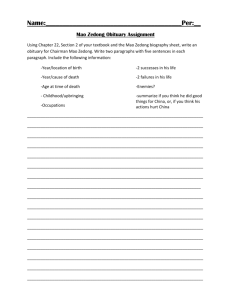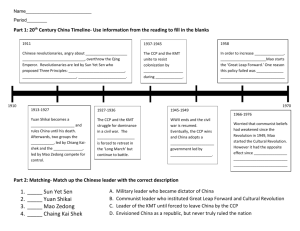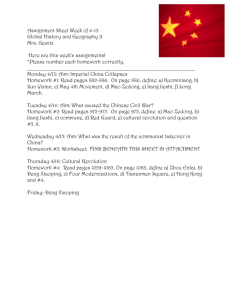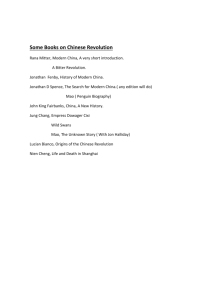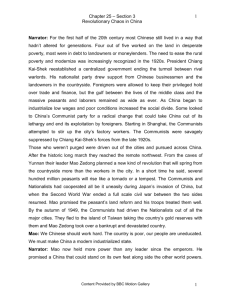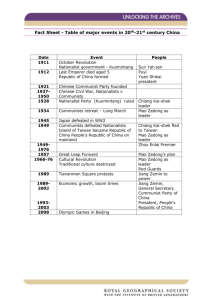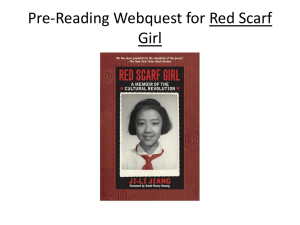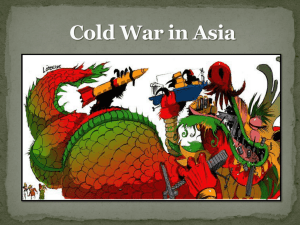Mao Zedong
advertisement
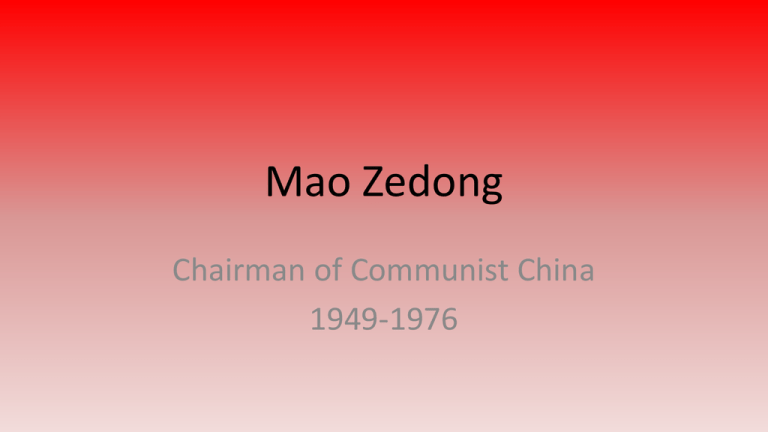
Mao Zedong Chairman of Communist China 1949-1976 The Life of Mao Zedong The Life of Mao Zedong The Life of Mao Zedong “Power comes from the barrel of a gun” The Life of Mao Zedong "Revolution is not a dinner party, nor an essay, nor a painting, nor a piece of embroidery; it cannot be so refined, so leisurely and gentle, so temperate, kind, courteous, restrained and magnanimous. A revolution is an insurrection, an act of violence by which one class overthrows another." — Mao, February 1927 The Life of Mao Zedong The Life of Mao Zedong Mao liked to rule from bed; often summoning his colleagues from their own beds in the middle of the night Mao as Leader of China Mao as Leader of China Mao as Leader of China • Five Year Plan • Great Leap Forward • Cultural Revolution • Hundred Flowers Campaign "People who try to commit suicide — don't attempt to save them! . . . China is such a populous nation, it is not as if we cannot do without a few people” • Accounts of Struggle Sessions “... the Cultural Revolution began and I was transferred to another labor camp.... Two years after I had been in this new camp, I received a parcel from my family. Immediately, an inmate accused me of giving something out of it to another prisoner. I was dragged to the office. Without any investigation, the officer assembled the entire camp to start a struggle session against me. In the session the officer suddenly asked me whether I had committed my alleged original crime leading to my 8year sentence. I was stunned. It then dawned on me that this session was in fact prearranged. The parcel was only a pretense. Their real motive was once again to force me to admit all my alleged crimes. "I did not commit any crimes," I asserted firmly. Immediately two people jumped on me and cut off half of my hair. The officer screamed again: "Are you guilty?" I replied firmly again, "No." Two people then used a rope to tie my hands back tightly. It was connected to a loop around my shoulder and underneath my armpits. It was knotted in such a way that a slight movement of my hands would cause intense pain. This struggle session lasted for two hours. Afterwards, they untied me and handcuffed me instead. The handcuffs became a part of me for the next one hundred days and nights....” • • You Xiaoli was standing, precariously balanced, on a stool. Her body was bent over from the waist into a right angle, and her arms, elbows stiff and straight, were behind her back, one hand grasping the other at the wrist. It was the position known as "doing the airplane." Around her neck was a heavy chain, and attached to the chain was a blackboard, a real blackboard, one that had been removed from a classroom at the university where You Xiaoli, for more than ten years, had served as a full professor. On both sides of the blackboard were chalked her name and the myriad crimes she was alleged to have committed.... The scene was taking place at the university, too, in a sports field at one of China's most prestigious institutions of higher learning. In the audience were You Xiaoli's students and colleagues and former friends. Workers from local factories and peasants from nearby communes had been bused in for the spectacle. From the audience came repeated, rhythmic chants.... "Down with You Xiaoli! Down with You Xiaoli!“ "I had many feelings at that struggle session," recalls You Xiaoli. "I thought there were some bad people in the audience. But I also thought there were many ignorant people, people who did not understand what was happening, so I pitied that kind of person. They brought workers and peasants into the meetings, and they could not understand what was happening. But I was also angry." • Lin Biao; Mao’s chosen successor Death of Mao Death of Mao Chinese Nationalism….. Patriotic or crazy? It’s the season of “love” • So why not express that love….of history….with a poem?!?!?! BELLWORK 1. List four results of the CCW for China. 2. How did the victory of the CCP affect Mao’s relationship with Stalin? 3. How did the victory of the CCP affect China’s relationship with the US? 4. The US viewed Stalin as the mastermind behind the CCP – to what extent do you agree with this? 5. THINKER: TOK TIME! Read pg. 264 Can a contemporary poem or song give us a better understanding of an historical event than a contemporary diary or journalist's report?
